Early intervention provides services and supports to infants and young children with developmental delays and disabilities and their families. Evidence-based practices in early intervention focus on the following: a) building family confidence, knowledge, and skills to support their child’s development and family goals through family coaching; b) responsiveness to each family’s unique needs and perspectives through shared-decision making; and c) family and professional collaboration.
The Pyramid Model framework and early intervention both emphasize collaboration among early intervention team members and families with a focus on building the capacity of professionals and families to support young children’s social and emotional development. Early intervention professionals implementing Pyramid Model practices use family coaching to help families understand and promote their child’s social and emotional development, set goals, implement interventions to prevent and address behaviors that are challenging, and enhance healthy attachment relationships.
Related Resources
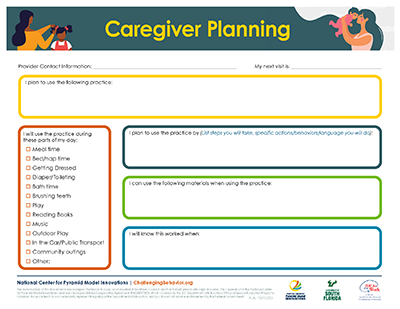
Early interventionists can use this written manual in the joint planning process with caregivers to organize and write out a plan to implement a caregiving practice with their child in between home visits. Encourage caregivers to leave the plan in an easy place to refer to as they need it.
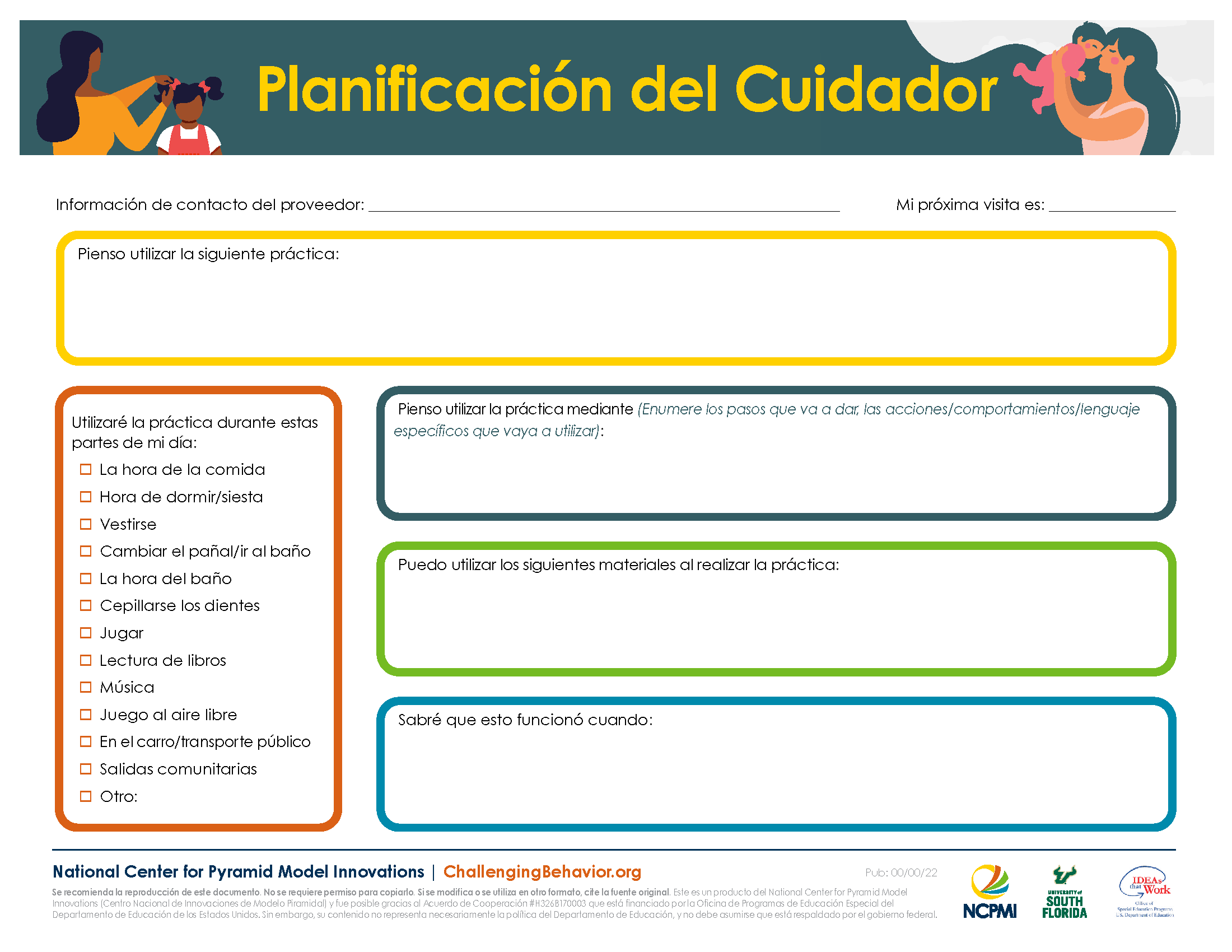
Early interventionists can use this written manual in the joint planning process with caregivers to organize and write out a plan to implement a caregiving practice with their child in between home visits. Encourage caregivers to leave the plan in an easy place to refer to as they need it.
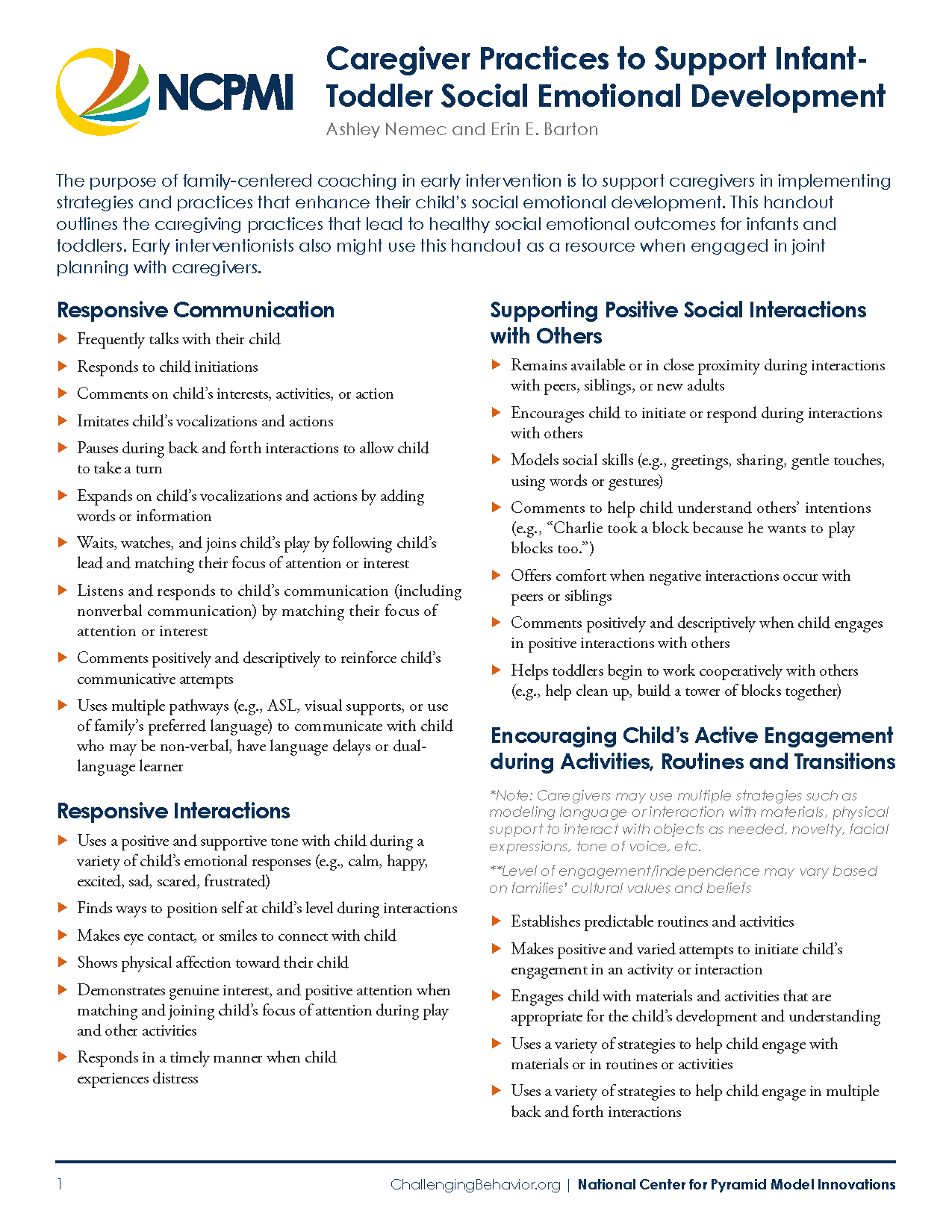
This handout outlines the caregiving practices that lead to healthy social-emotional outcomes for infants and toddlers. Early interventionists might use this handout as a resource when engaged in joint planning with caregivers.
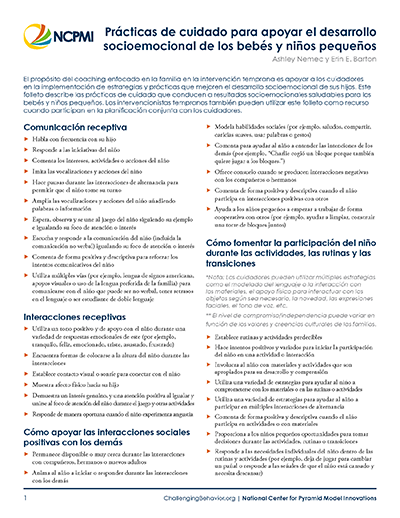
This handout outlines the caregiving practices that lead to healthy social-emotional outcomes for infants and toddlers. Early interventionists might use this handout as a resource when engaged in joint planning with caregivers.
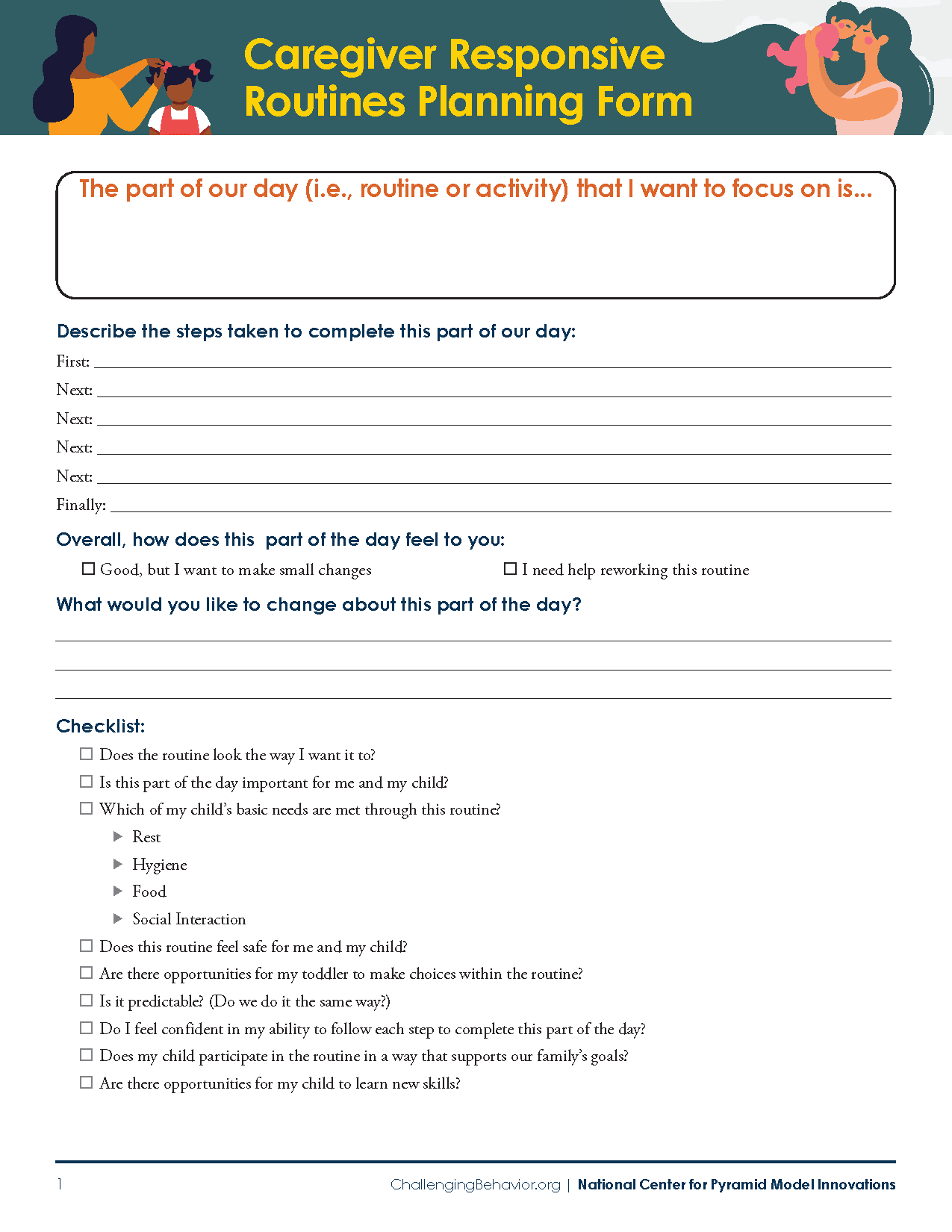
Early interventionists can use this form during home visits with caregivers to help them talk through their current daily routines as well as help them to plan out the ways they will embed supports that are responsive to their infant or toddler’s social-emotional development and teach new skills during specific moments in the family’s day.
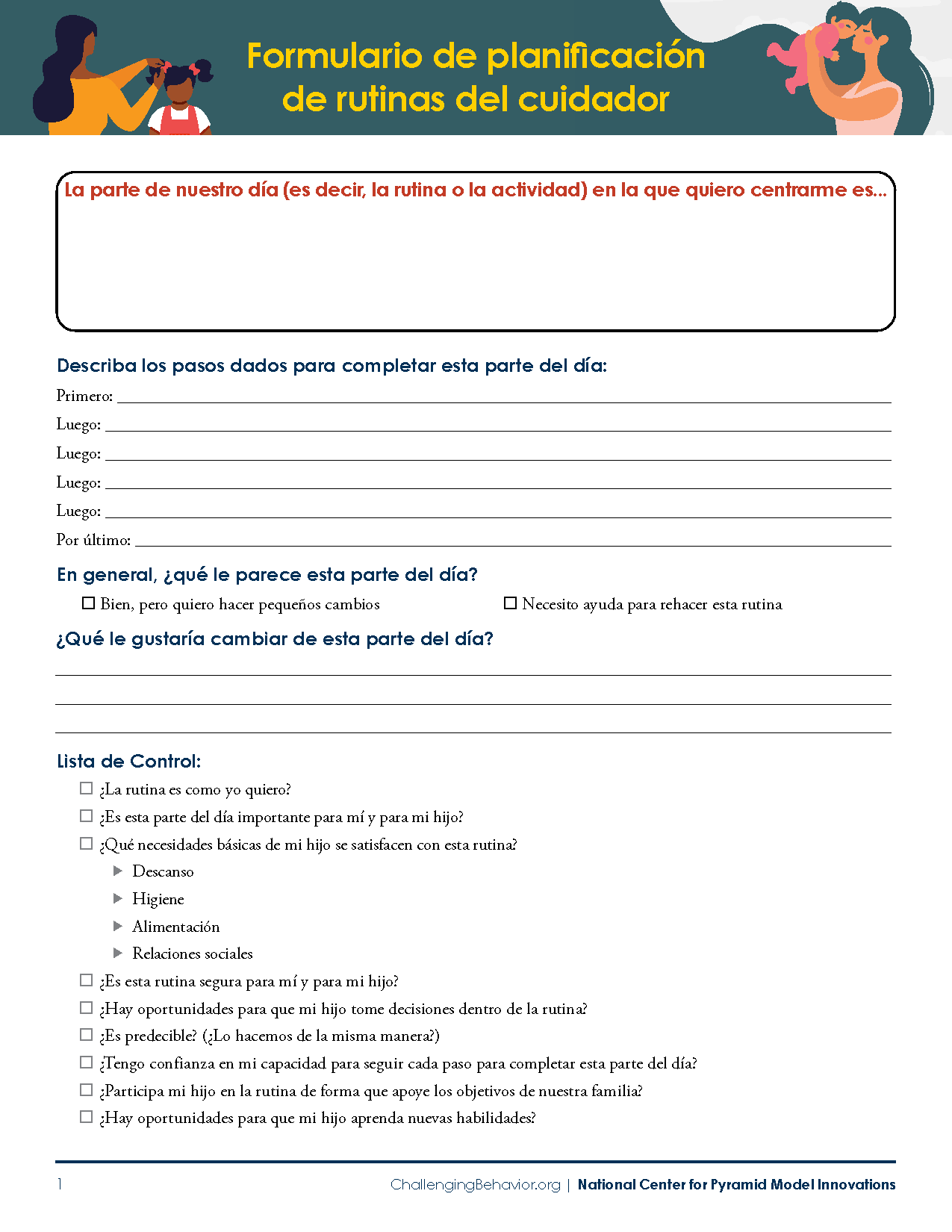
Early interventionists can use this form during home visits with caregivers to help them talk through their current daily routines as well as help them to plan out the ways they will embed supports that are responsive to their infant or toddler’s social-emotional development and teach new skills during specific moments in the family’s day.
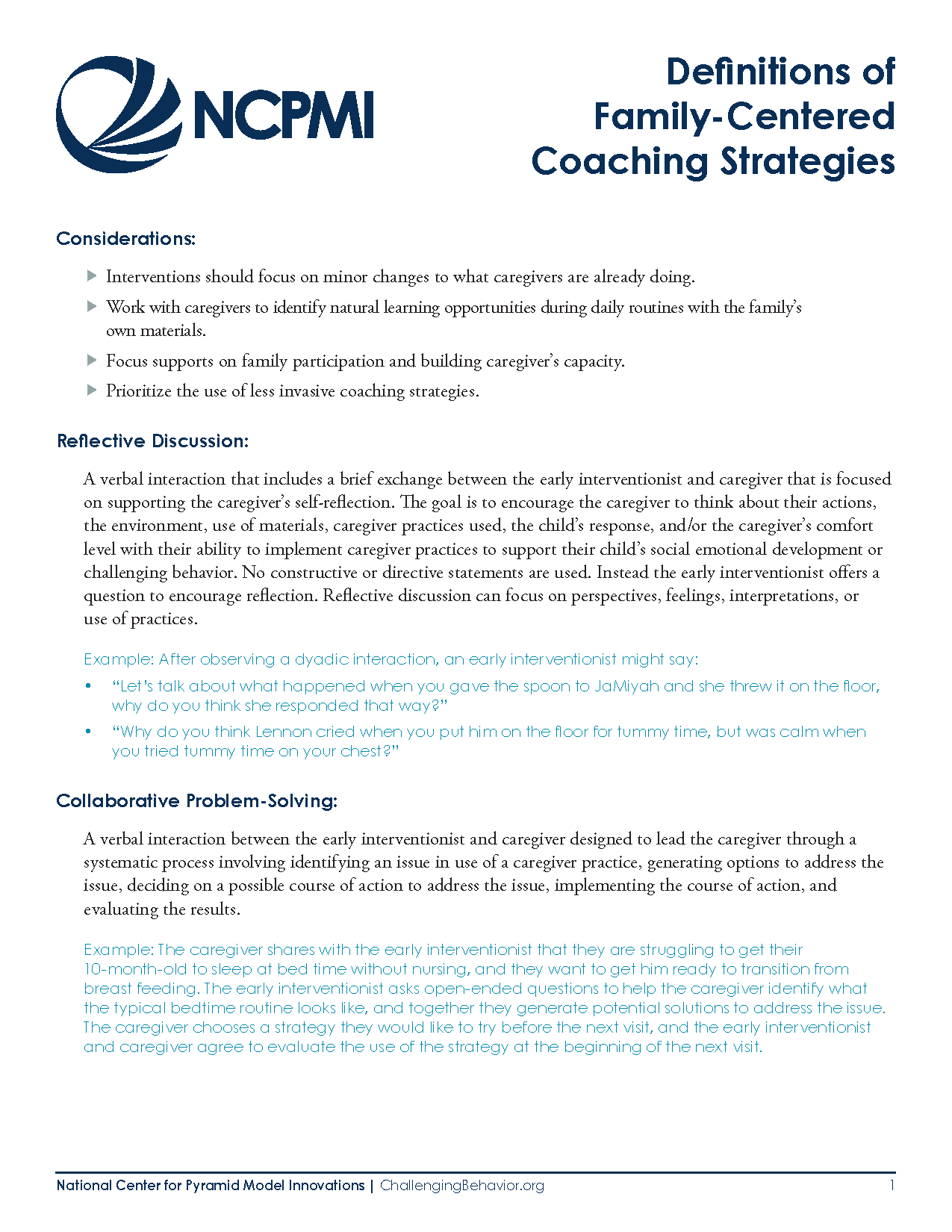
This resource provides definitions and examples that illustrate family coaching strategies. These strategies are used by early interventionists to support caregivers as they build their competence and confidence in supporting their child’s social emotional development.
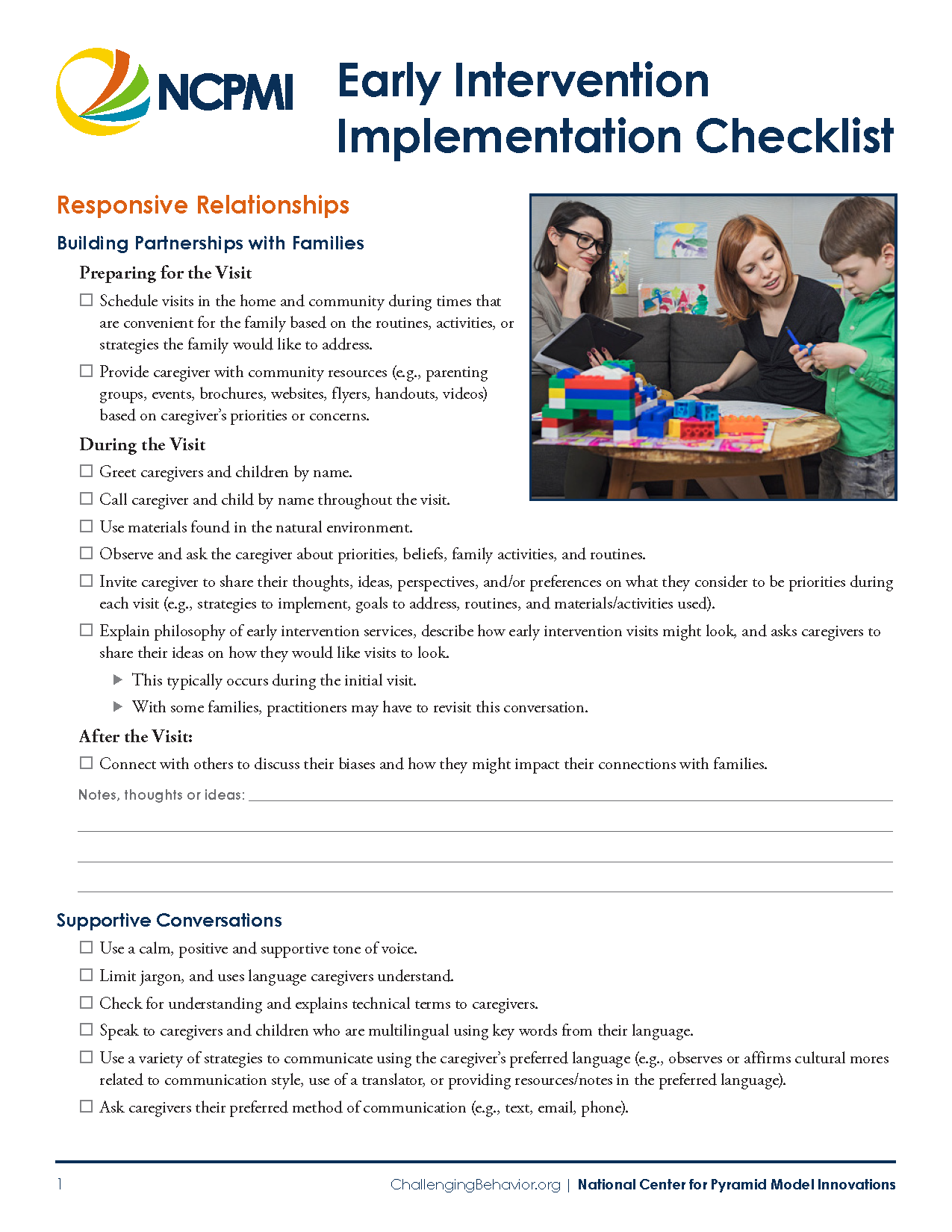
The Early Intervention Implementation Checklist is designed to align with the Early Intervention Pyramid Practices Fidelity Instrument (EIPPFI). Coaches and early interventionists can use this tool to support early interventionists’ self-reflection of the implementation of Pyramid practices, and prepare for shared goals and action planning.
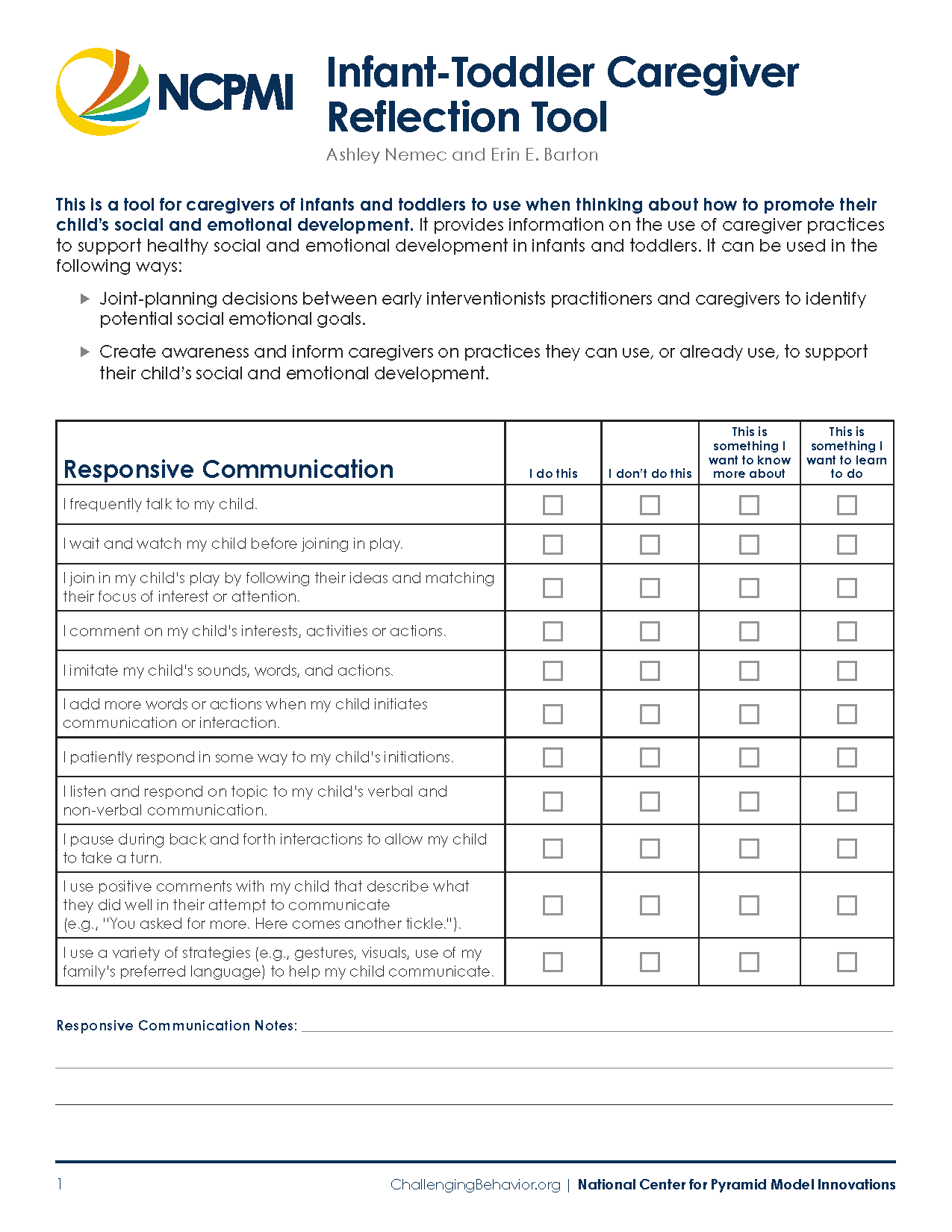
This tool provides information on the use of caregiver practices to support healthy social emotional development in infants and toddlers. Early interventionists and caregivers can use this tool to build awareness and inform caregivers about what practices they currently use or can use to support their child’s healthy social emotional development. This tool might also be used to aid joint planning decisions when identifying social emotional goals with caregivers.
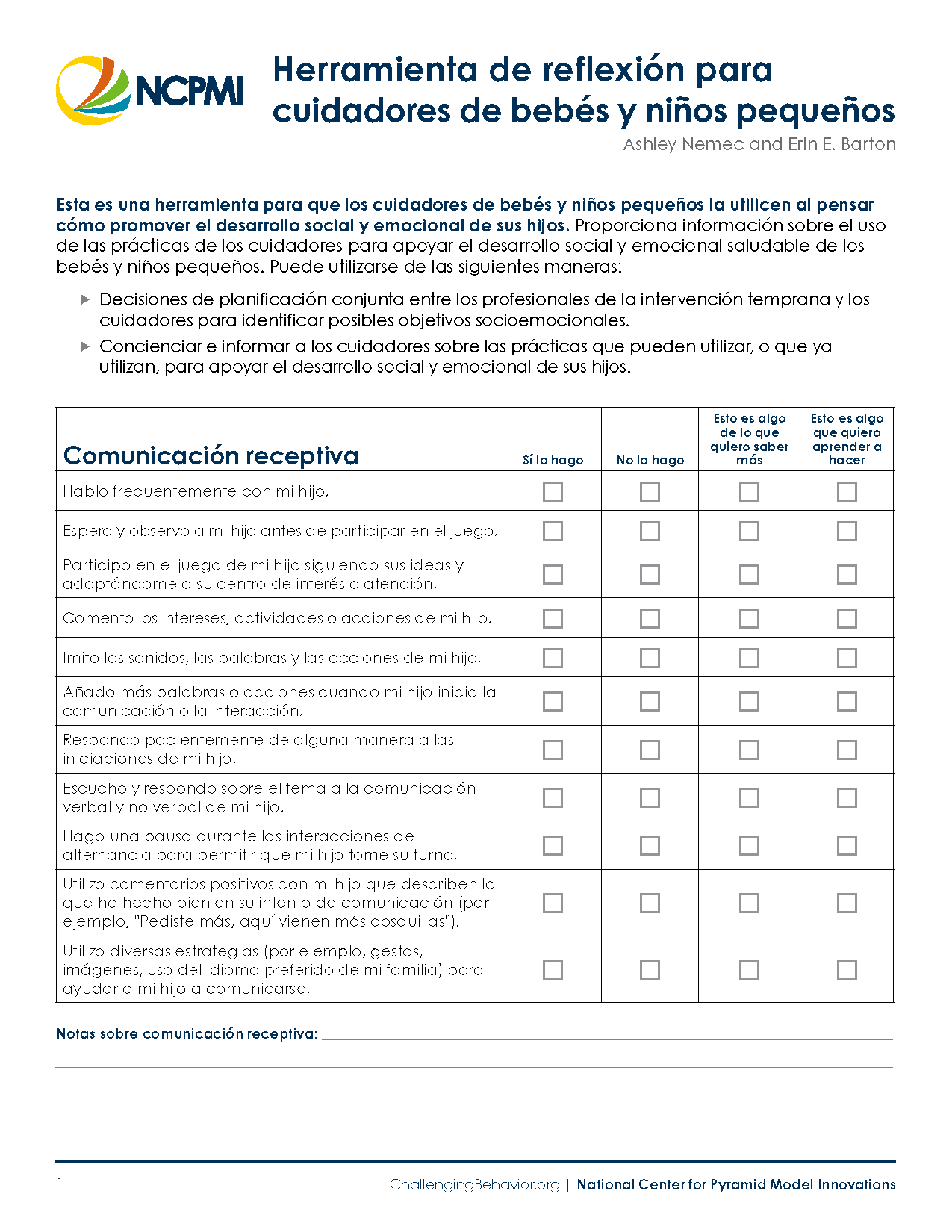
This tool provides information on the use of caregiver practices to support healthy social emotional development in infants and toddlers. Early interventionists and caregivers can use this tool to build awareness and inform caregivers about what practices they currently use or can use to support their child’s healthy social emotional development. This tool might also be used to aid joint planning decisions when identifying social emotional goals with caregivers.
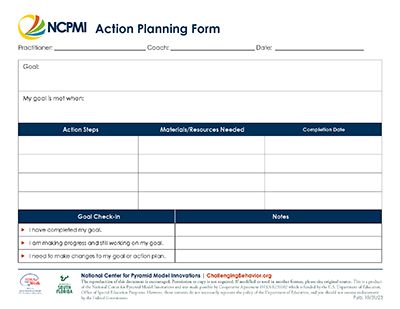
Coaches and teachers can use this form during shared goals and action planning to document goals and action plans.
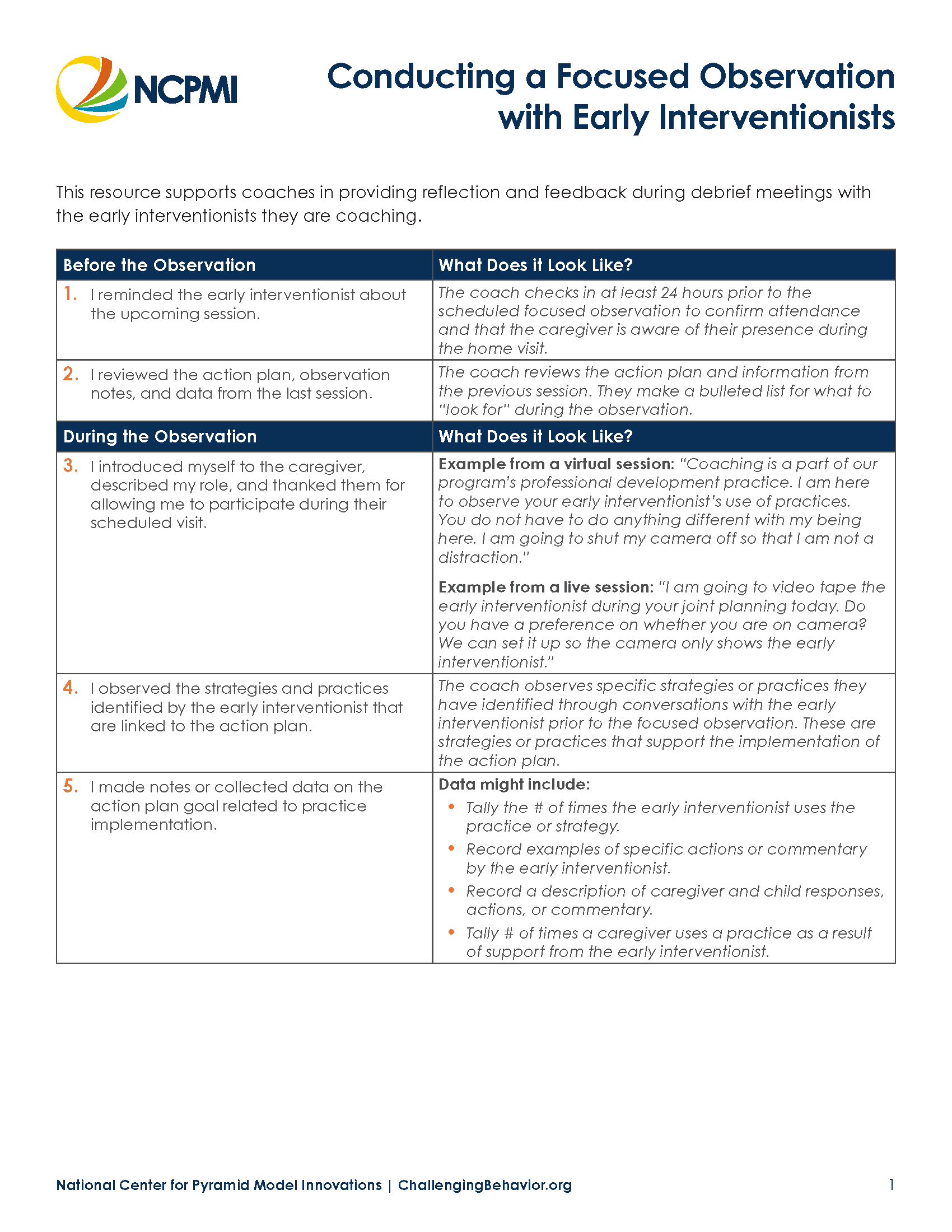
This resource supports coaches in preparing for and conducting quality focused observations with early interventionists.
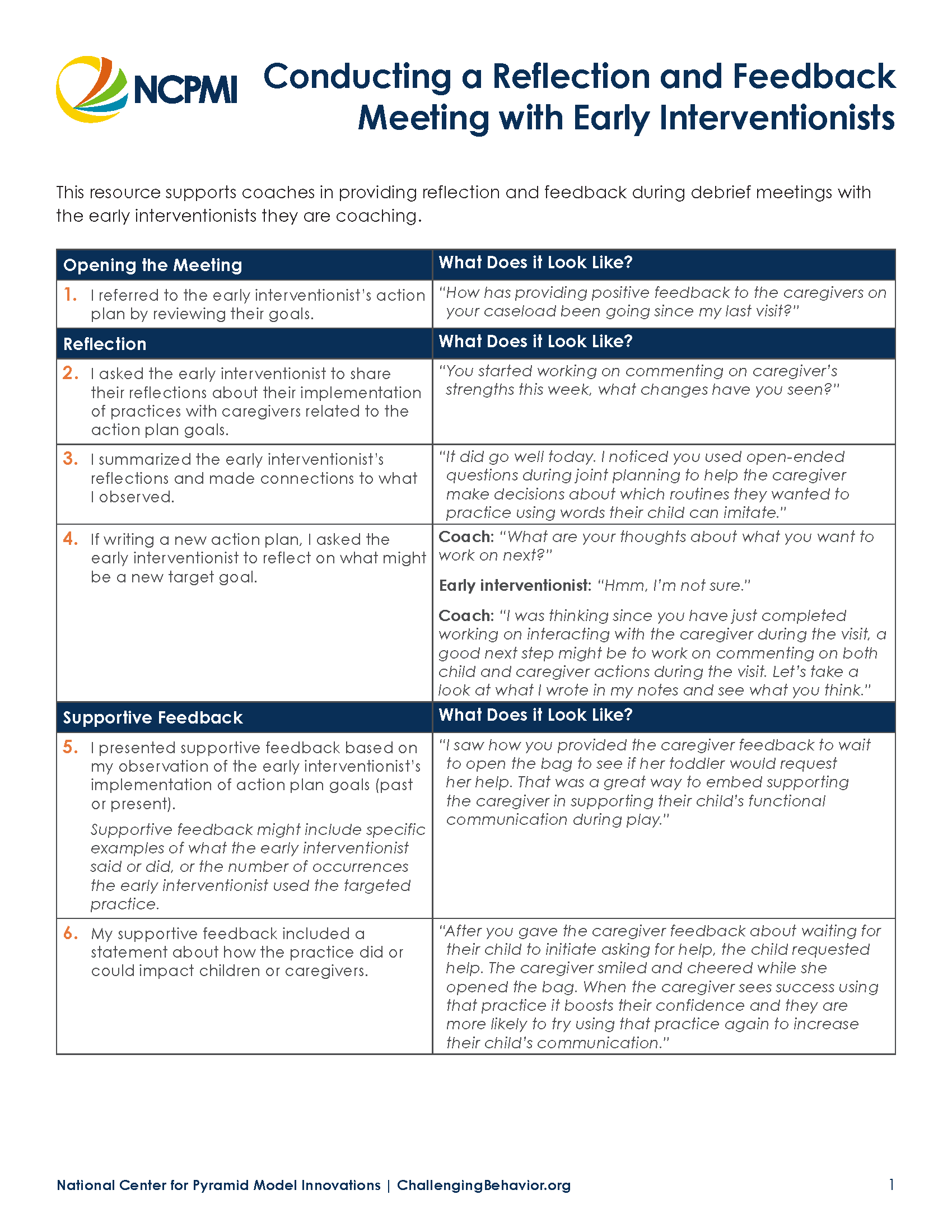
This resource supports coaches in providing reflection and feedback during debrief meetings with the early interventionists they are coaching.
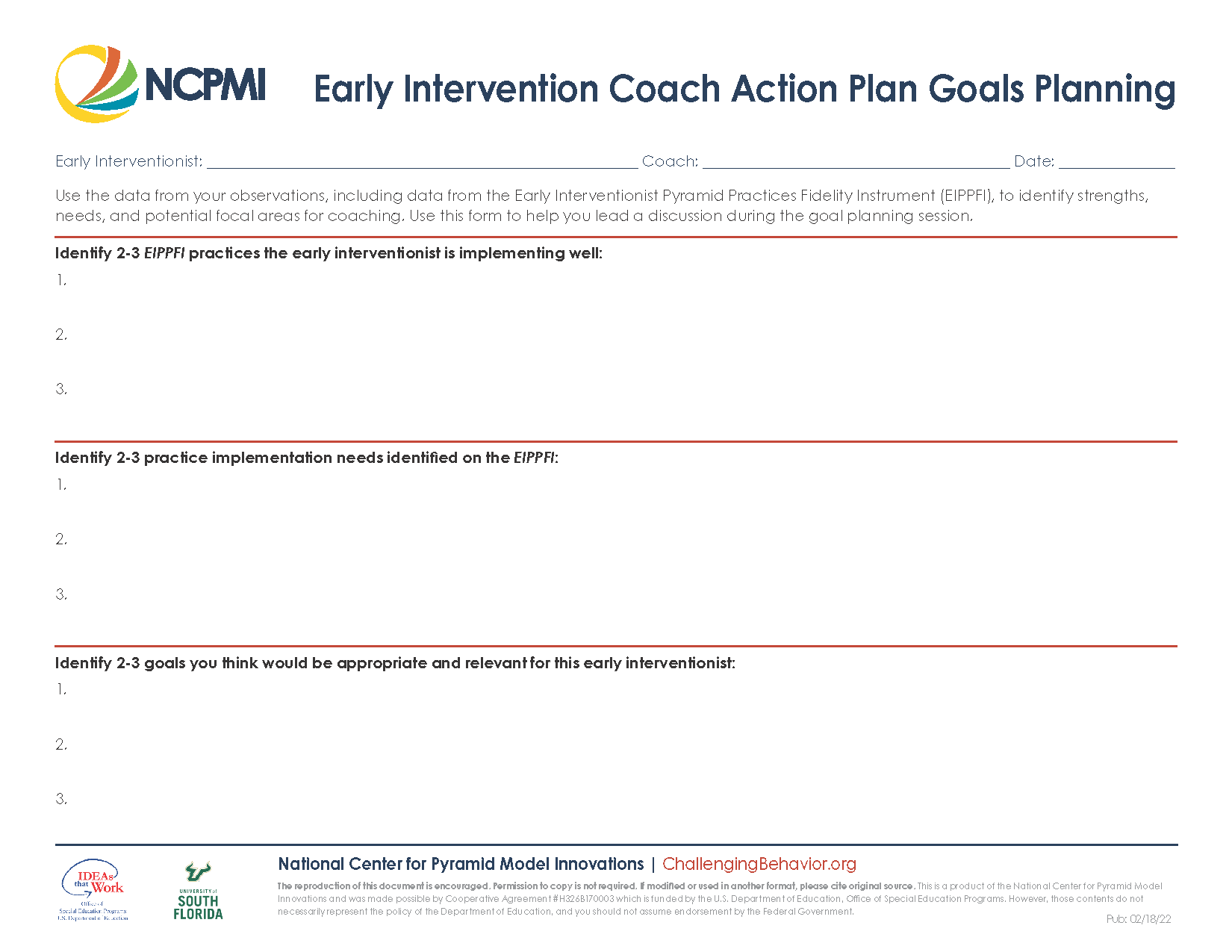
Coaches use data from observations to identify strengths, needs, and potential focal areas for coaching. Use this form to help you lead a discussion during the goal planning session.

The Early Intervention Implementation Checklist is designed to align with the Early Intervention Pyramid Practices Fidelity Instrument (EIPPFI). Coaches and early interventionists can use this tool to support early interventionists’ self-reflection of the implementation of Pyramid practices, and prepare for shared goals and action planning.
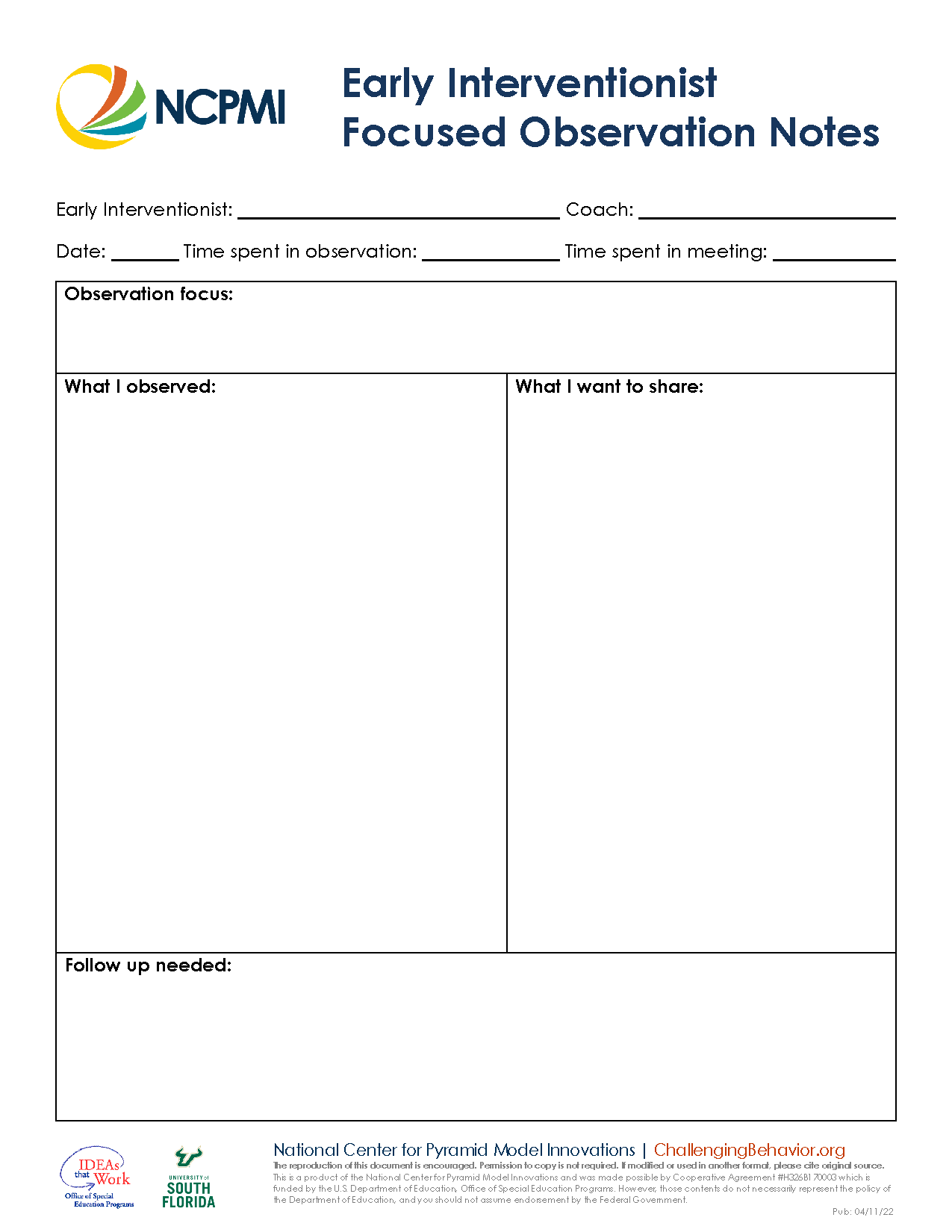
Coaches of early interventionists can use this form to record action plan related data during focused observations, and organize the information they want to share with coachees prior to the reflection and feedback meeting.
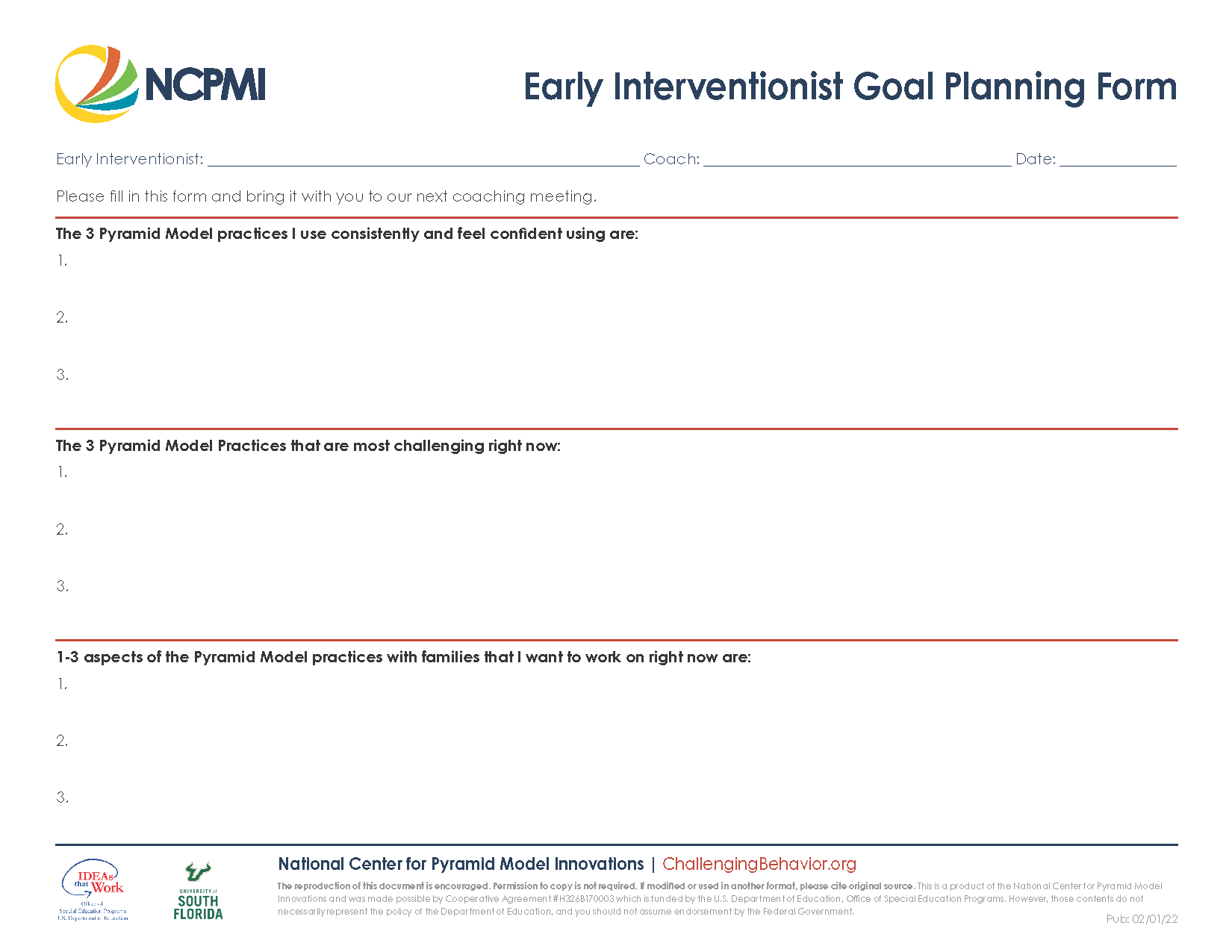
Early interventionists fill in this form, which is reviewed with their coach during coaching meetings.
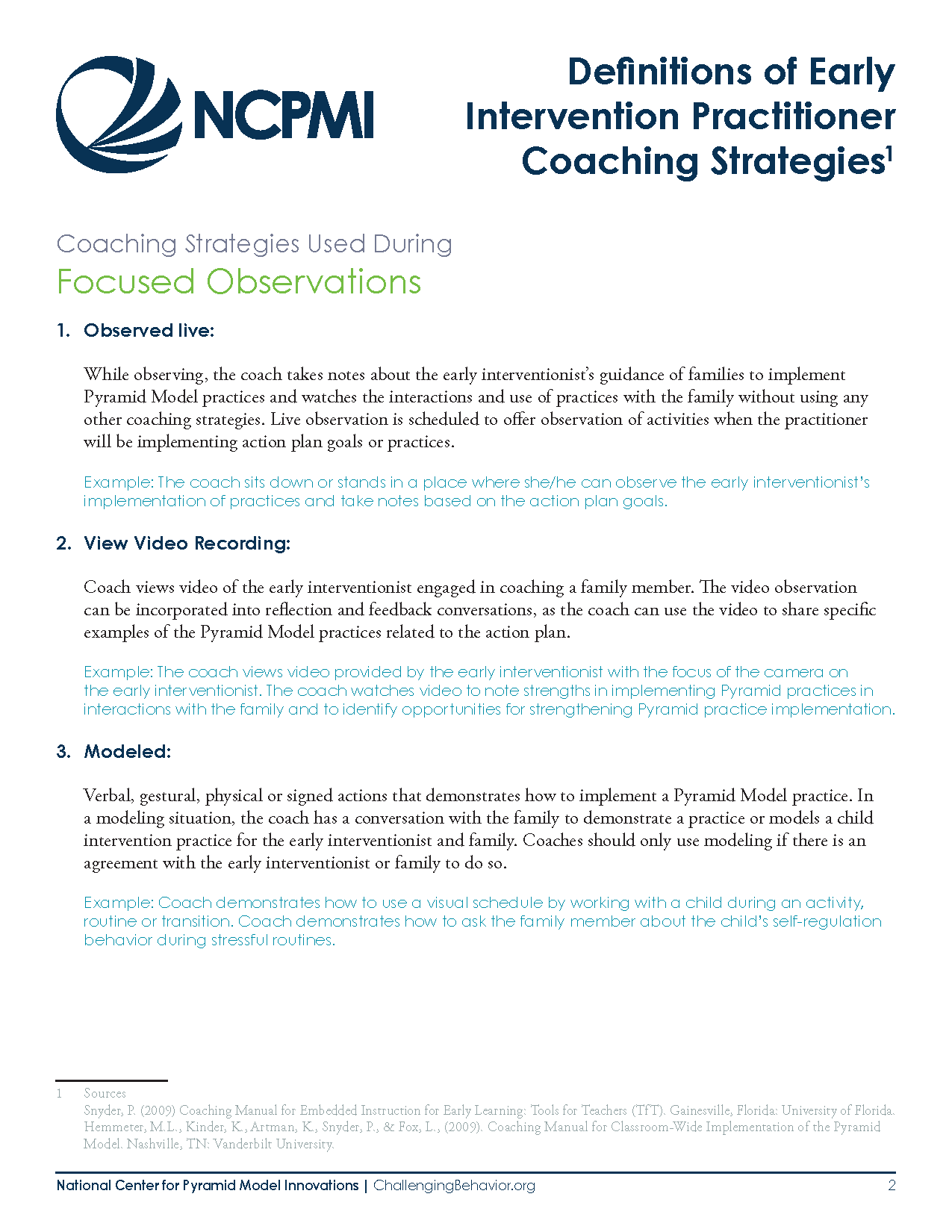
What are the strategies that can be used during your observations and debriefing sessions? This handout provides a list and operational definitions.
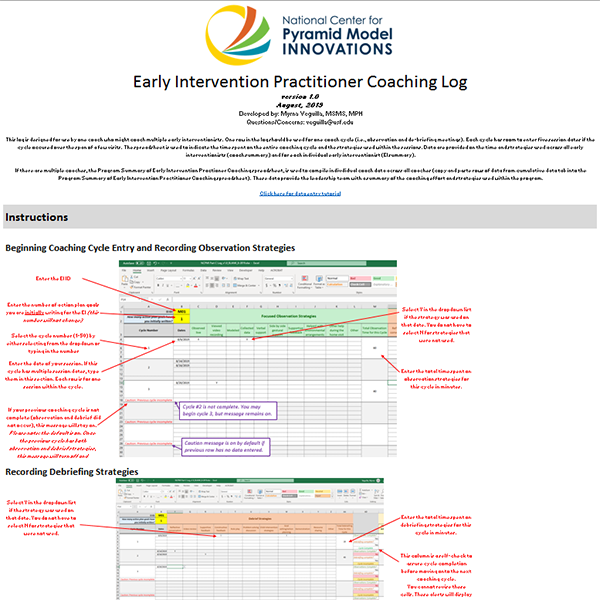
This log is designed for use by one coach who might coach multiple early interventionists.? The spreadsheet is used to indicate the time spent on the entire coaching cycle and the strategies used within the sessions. Data are provided on the time and strategies used across all practitioners(coach summary) and for each individual practitioner (EI summary).
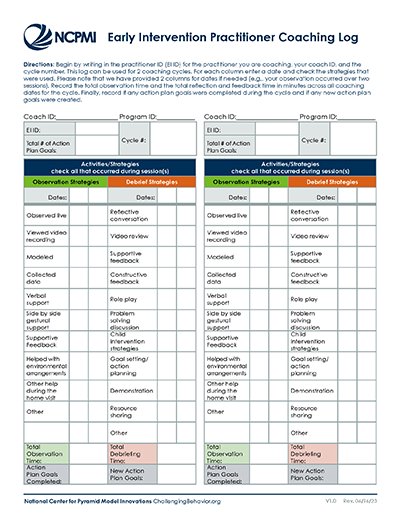
A log for practitioner coaches to use to track time, strategies, and practice-based coaching cycles provided to early intervention practitioners.
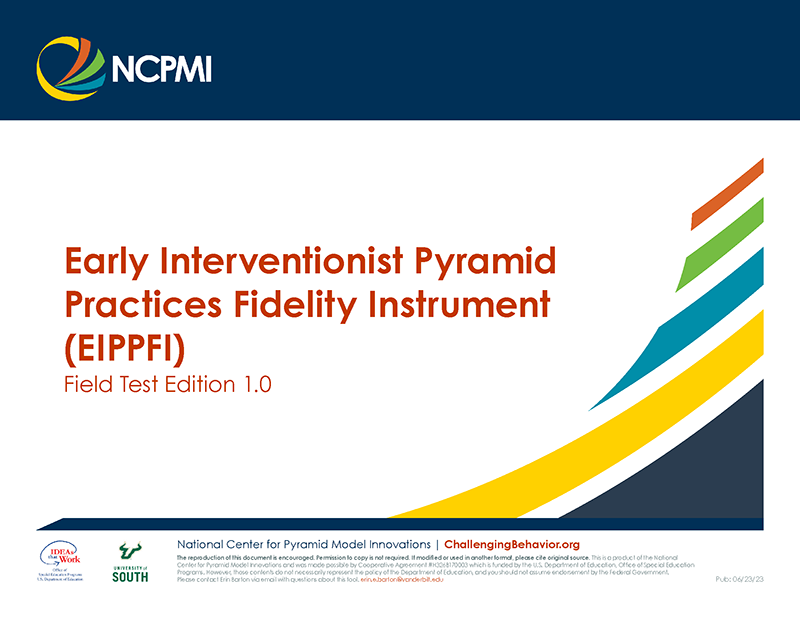
The Early Intervention Pyramid Practice Fidelity Instrument (EIPPFI) is used to assess the implementation of Pyramid Model practices by early interventionists in the coaching of family caregivers. EIPPFI practices are aligned with the Division for Early Childhood Recommended Practices and the Principles of Early Intervention. EIPPFI organizes practices within six practice categories: 1) Building Partnerships with Families; 2) Social Emotional Development; 3) Family-centered Coaching; 4) Dyadic Relationships; 5) Children with Challenging Behavior; and 6) Social Emotional Assessment.
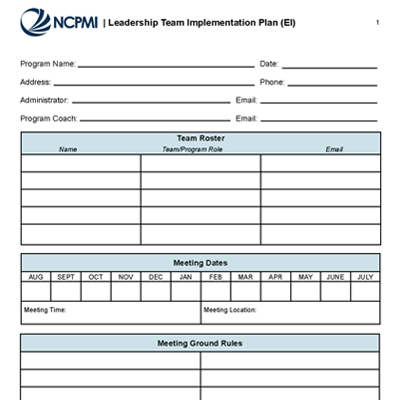
This form is used by Early Intervention Program Leadership Teams to write down their implementation action plans related to each benchmark of quality.

This form is used by Early Intervention Program Leadership Teams to write down their implementation action plans related to each benchmark of quality.
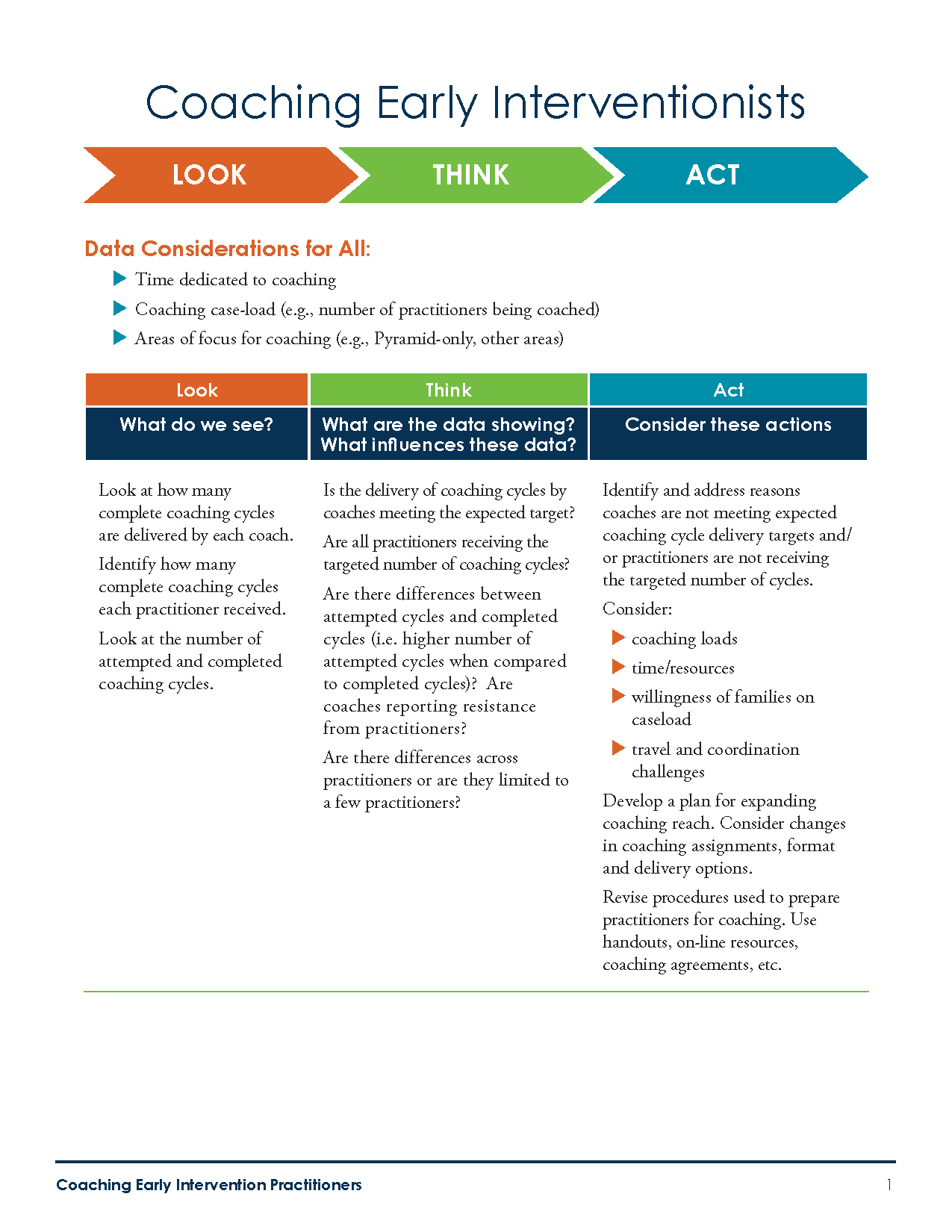
The Leadership Team can use this document to guide the three steps of data review and decision-making (Look-Think-Act). The guide provides the information on the data to review, the questions to consider, and potential actions. This guide is used to examine data from the Early Intervention Practitioner Coaching Log and the EIPPFI.
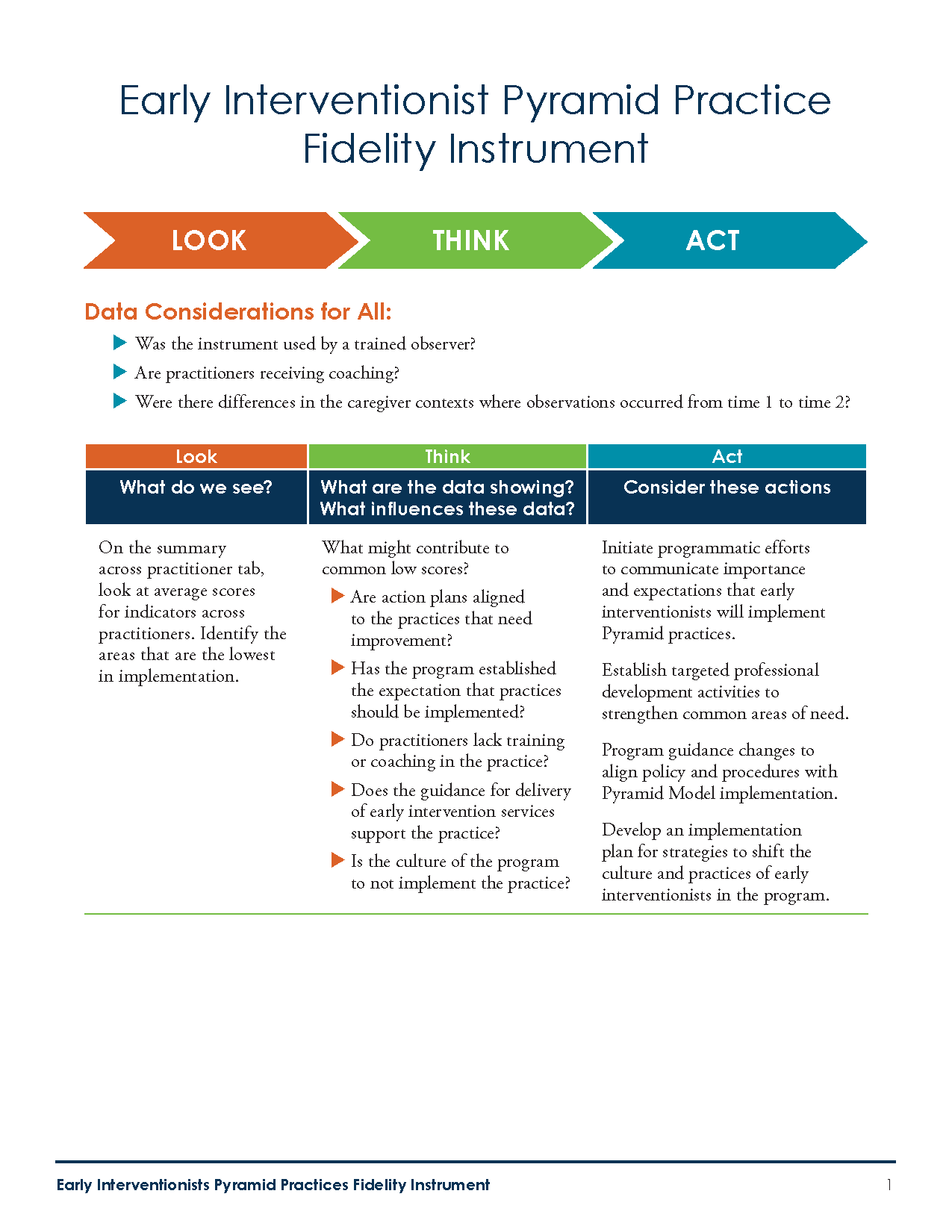
The Leadership Team can use this document to guide the three steps of data review and decision-making (Look-Think-Act). The guide provides the information on the data to review, the questions to consider, and potential actions. This guide is used to examine data from the Early Intervention Practitioner Pyramid Practice Fidelity Instrument (EIPPFI).
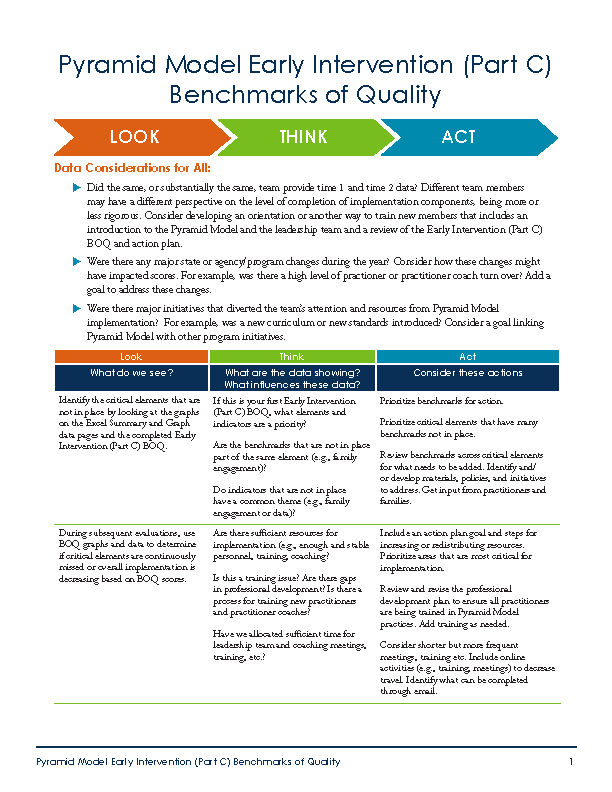
The Leadership Team can use this document to guide the three steps of data review and decision-making (Look-Think-Act). The guide provides the information on the data to review, the questions to consider, and potential actions. This guide is used with the data summaries of the Pyramid Model Early Intervention (Part C) Benchmarks of Quality.
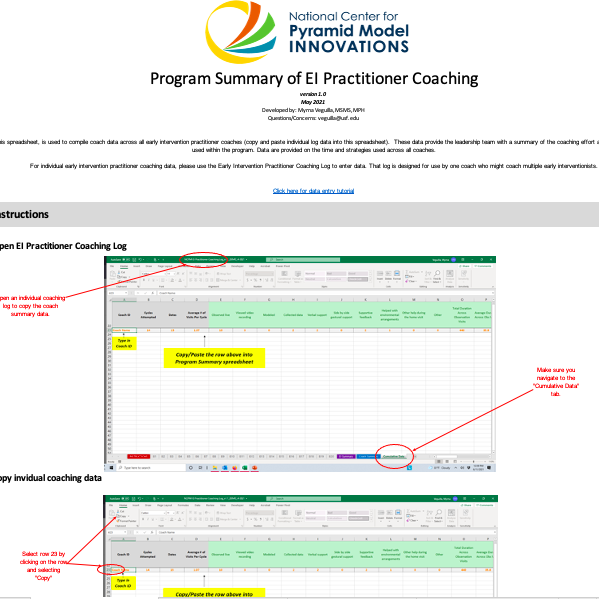
This spreadsheet is to be used to combine data from EI Practitioner Coaches in the same program. It provides a summary across EI Practitioner Coaches.
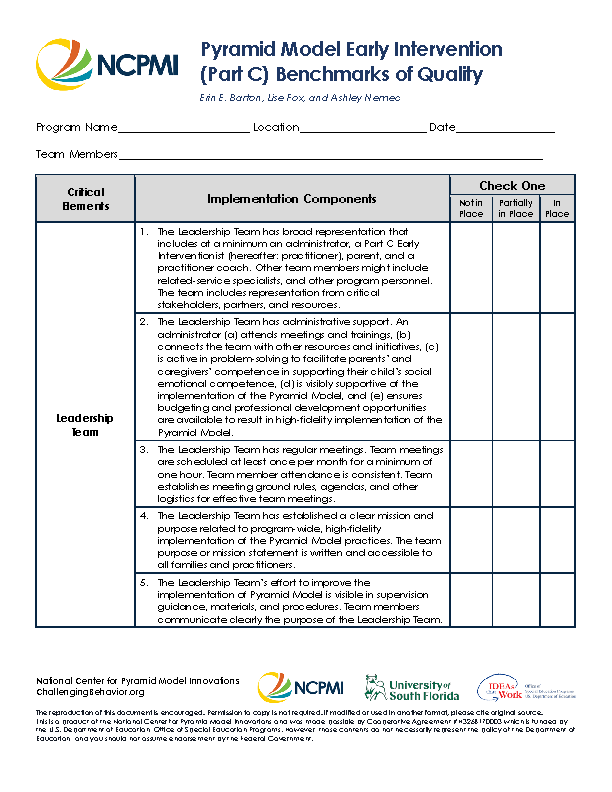
Authors: Erin E. Barton, Lise Fox, and Ashley Nemec (2018). The Pyramid Model Early Intervention (Part C) Benchmarks of Quality (EI BoQ) is designed to help agencies/programs evaluate their progress toward implementing the Pyramid Model program-wide. The tool was revised in 2018.
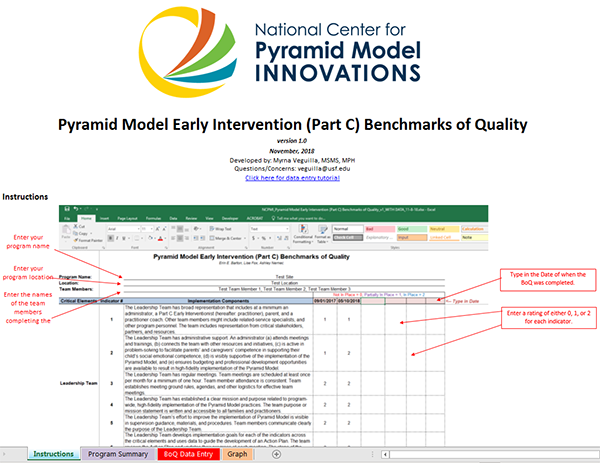
Data entry spreadsheet for the Pyramid Model Early Intervention (Part C) Benchmarks of Quality v1.0
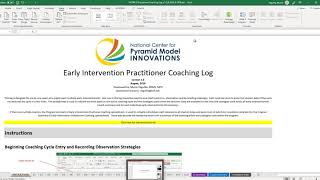
This tutorial guides users through the NCPMI Early Intervention Practitioner Coaching Log. Viewers will learn how to use each tab within the workbook.
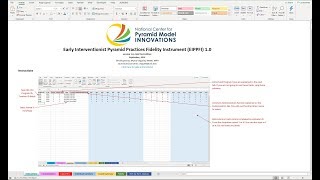
This tutorial guides users through the NCPMI Early Interventionist Pyramid Practices Fidelity Instrument (EIPPFI) 1.0 Data Entry Spreadsheet. Viewers will learn how to use each tab within the workbook.
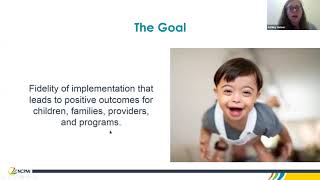
The National Center for Pyramid Model Innovations has developed a framework, practices and tools to support implementation of the Pyramid Model by Part C, Early Intervention programs. This webinar describes the framework, critical elements, practices, and fidelity tools that can be used to support program-wide implementation and early interventionists? practices. The program-wide implementation framework and critical elements were designed to be implemented within the multiple types of service delivery models used across Early Intervention Programs and states. The early interventionists? practices are focused on building families? confidence and competence in supporting their child’s social emotional development. This webinar may be helpful for Part C state leaders, program leaders, and early interventionists to identify which program wide elements are already in place, which Pyramid Model practices their staff are already using well, and next steps for their programs or individual goals.
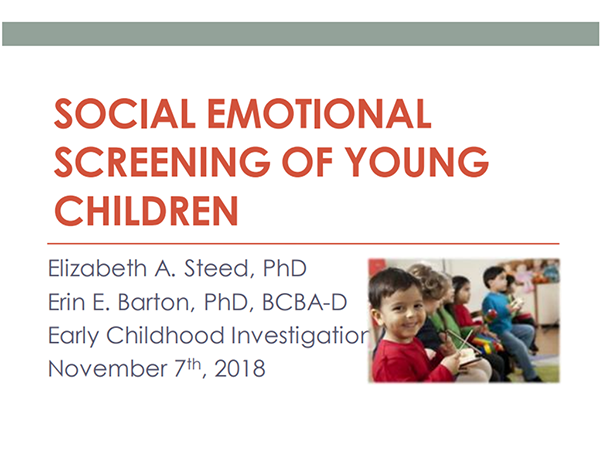
In this webinar, assessment and intervention experts, Erin Barton, PhD and Elizabeth Steed, PhD, describe the purpose of social-emotional screening of young children in the context of promoting social-emotional development and identifying children at risk for social-emotional difficulties. This webinar provides an overview of specific social-emotional screening tools and how one might pick a tool for their program’s use. The presenters use a case study to illustrate how to implement one of the most widely used tools, ASQ:SE-2, and make decisions about next steps for children at risk for social emotional challenges.
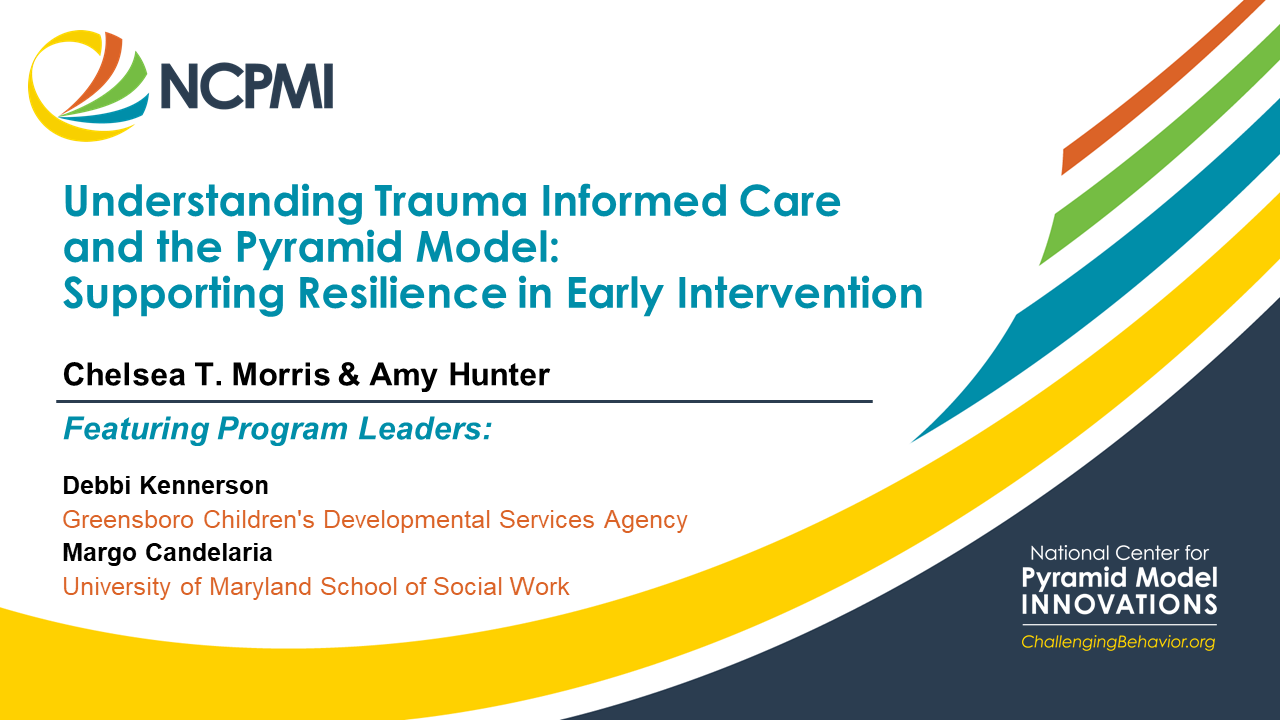
Childhood trauma may be more common than you think. Roughly 26 percent of children in the United States have witnessed or experienced a trauma before the age of 4 (Briggs-Gowan et al. 2010). It is highly likely that each provider in Early Intervention has worked with children and their families who have experienced trauma. Providers may not be aware of what a child has experienced, nor how the experiences impact the child and family. Join this webinar to hear more about trauma informed care, the Pyramid Model, and how these approaches support resilience for all children in early intervention, including those who have experienced trauma. This webinar will highlight the experiences of two Early Intervention programs, and will share resources you can use in your own programs.

Practice-Based Coaching (PBC) is an evidence-based coaching approach that supports practitioners to use effective teaching practices to promote positive child outcomes. PBC can be implemented in a variety of settings, including classrooms and center-based programs, family childcare homes, and early intervention and home-based programs. This webinar will outline the components of PBC and describe how to use PBC to coach early interventionists who are working with families in homes. The panelists will focus on using PBC to coach early interventionists to support families in enhancing their child’s social emotional competence. Panelists will share their experiences using PBC to coach early interventionists.
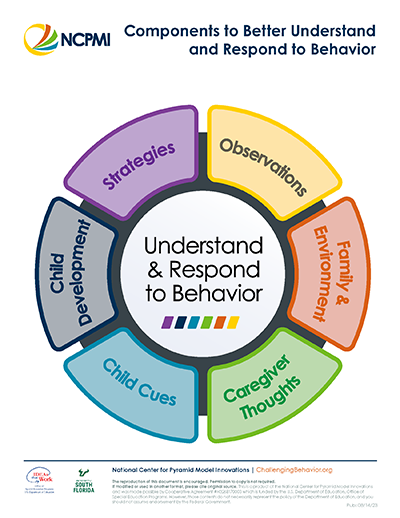
This handout illustrates the components to better understand and respond to behavior in a format that is easy to print.
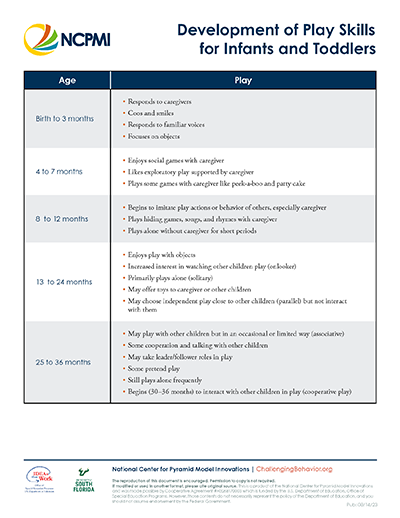
This handout provides the developmental milestones of play skills for infant and toddlers.
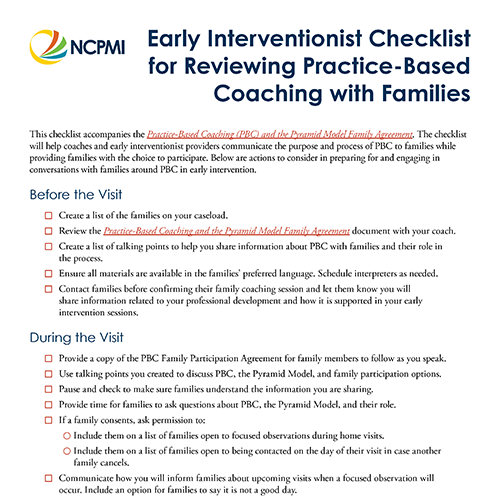
This checklist accompanies the Practice-Based Coaching and the Pyramid Model Family Agreement. The checklist will help coaches and early intervention providers create a plan to communicate the purpose and the process of Practice-Based Coaching (PBC) to families while providing families the choice to participate. Below are actions to consider in preparing for and engaging in conversation with families around PBC in early intervention.
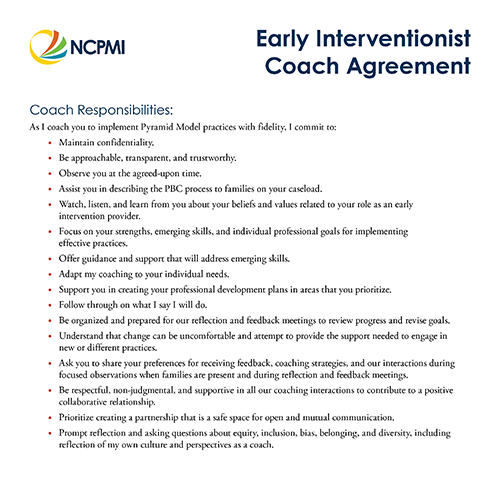
This agreement provides a context for having a discussion about the coaching partnership. The editable form allows a coach and early intervention provider to individualize the agreements to meet their coaching relationship needs.

This agreement provides a context for having a discussion about the coaching partnership. This editable form allows a coach and early intervention provider to individualize the agreements to meet their coaching relationship needs.

Coaches of early interventionists can use this form to record action plan related data during focused observations, and organize the information they want to share with coachees prior to the reflection and feedback meeting.
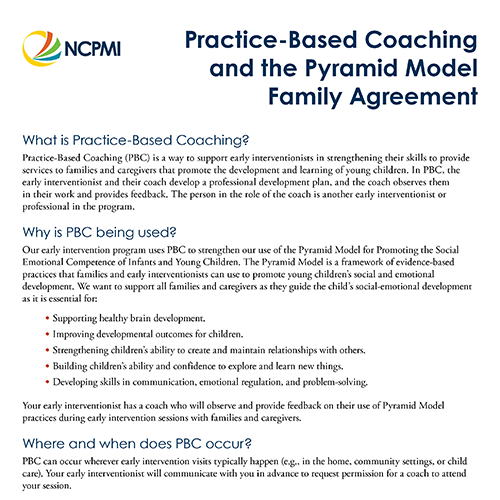
This handout can be used to guide early intervention providers to communicate the purpose and process of Practice-Based Coaching (PBC) to families while providing families with the choice to participate. Families can be provided a copy of the handout during a scheduled visit, and early intervention providers should engage in a discussion with families around the talking points outlined in the document. The Early Interventionist Checklist for Reviewing Practice-Based Coaching with Families can be used with this handout to help early interventionists and their practitioner coaches to prepare for discussions with families around PBC.
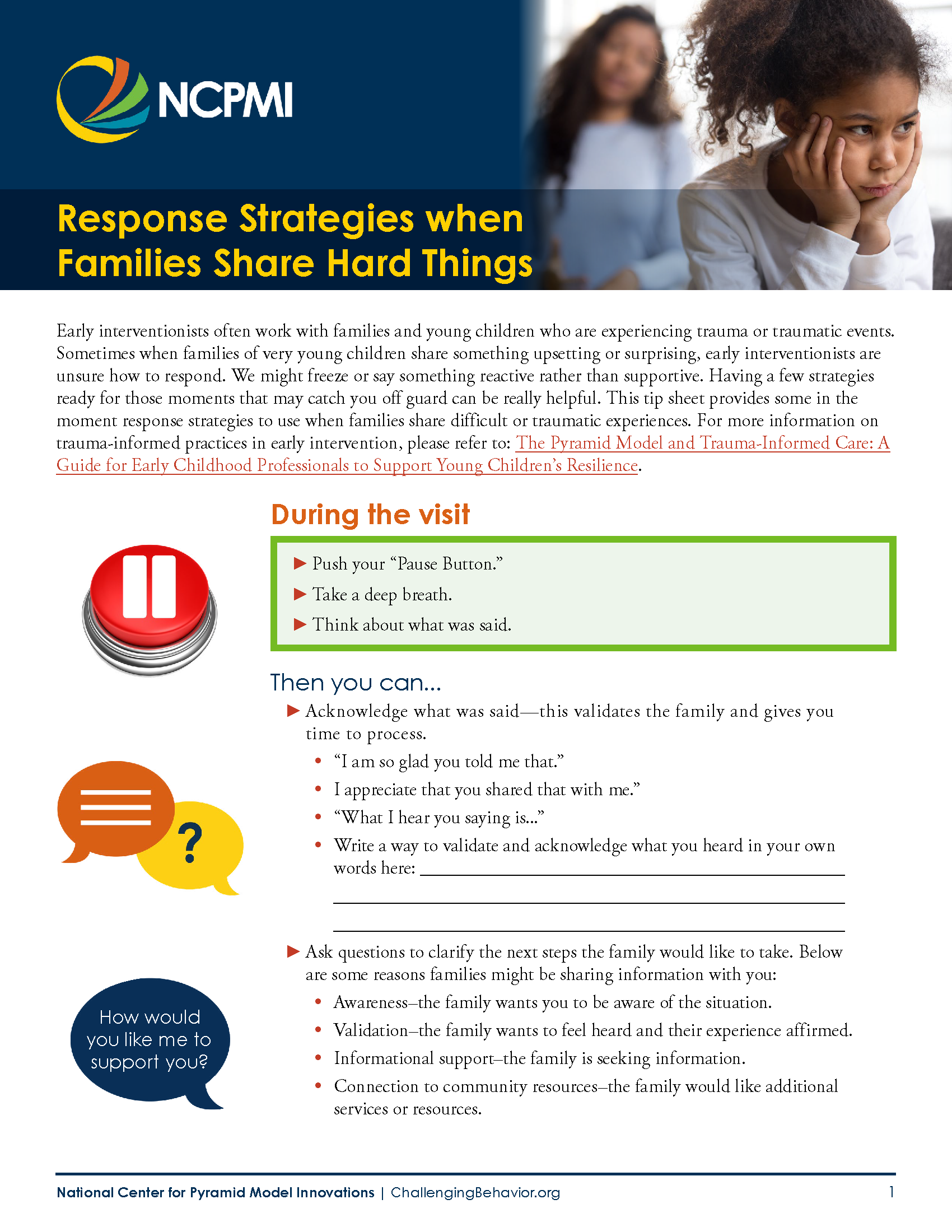
This tip sheet provides some “in the moment” and “after the visit” response strategies and reflection early intervention providers can use when families share difficult or traumatic experiences.
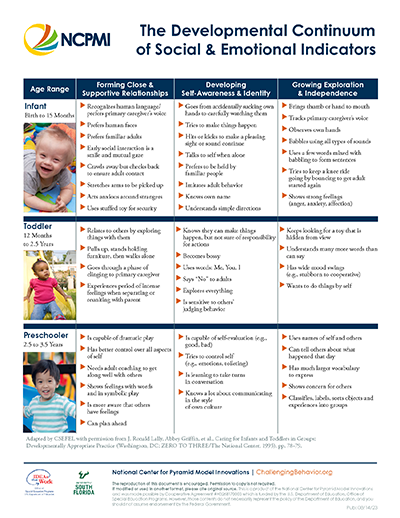
This one page fact sheet contains the developmental continuum of social and emotional indicators for infant, toddler, and preschool age children.



